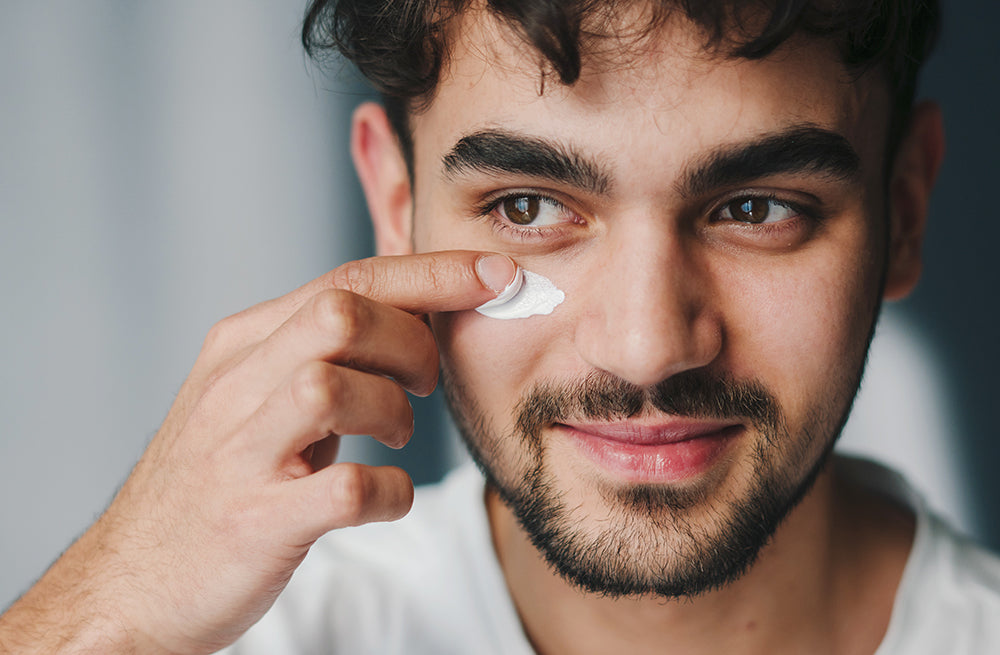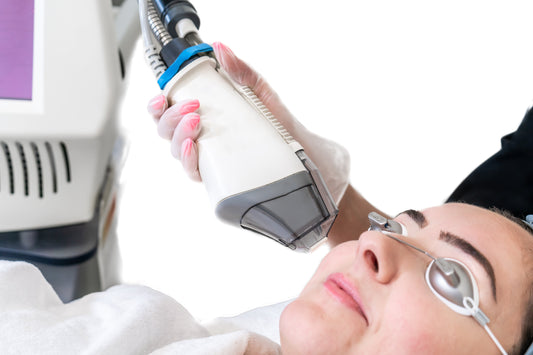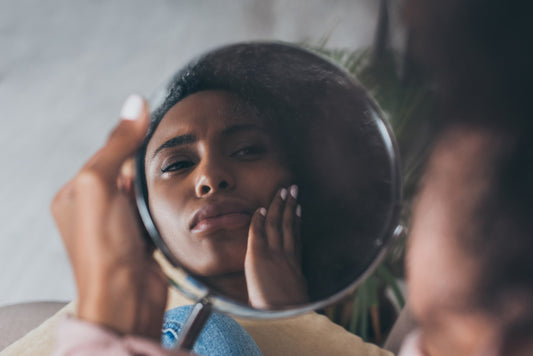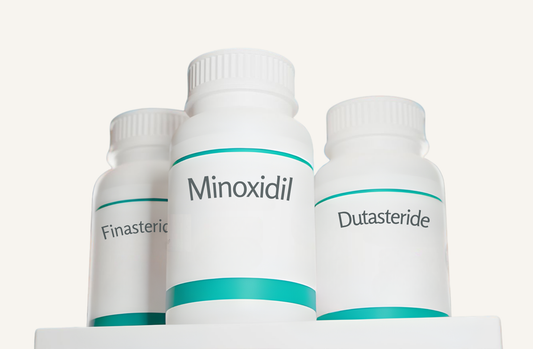The skin around your eyes is the most delicate on your whole face. There is less fat underneath and this area doesn’t have as many oil glands or collagen. This makes the skin especially vulnerable to fine lines and wrinkles. Even more, lifestyle choices like skimping on sleep and smoking only make matters worse. While getting more sleep and giving up bad habits can lead you in the right direction, you may be curious about trying an eye cream. But do eye creams make a difference? Does eye cream work for dark circles? And if so, which ingredients should you look for?
Read on to find out more about how eye cream works and which myths you should ignore when caring for this delicate area.
What is the Purpose of Eye Cream?
Standard moisturizers can sometimes irritate the skin around the eyes. Eye creams tend to be thicker and contain ingredients specially formulated to address this area by hydrating, brightening, firming, and reducing signs of aging like fine lines and wrinkles. Studies have shown that some anti-aging eye treatments can also help improve overall smoothness in this area while reducing the depth of larger wrinkles.1 The right ingredients can also protect against environmental damage, stimulate collagen, prevent discoloration, and even plump the area if needed. According to the Cleveland Clinic, the best ingredients for this area include antioxidants like vitamin C and E, retinol, hyaluronic acid, niacinamide, and sunscreen with a high SPF.2
Common Eye Cream Myths Debunked
Despite how common eye creams are, there is a lot of debate around whether or not they work. Let’s debunk some of the myths about this vulnerable area of your face so you can find the best solution for your needs.
Myth 1: Eye Cream Can’t Reduce Puffiness
While some eye creams have ingredients in them to plump under-eye skin and prevent a hollow or translucent appearance, there are some products that help reduce bags and puffiness. Ingredients like vitamin E and almond oil have been shown to reduce puffiness due to antioxidant and anti-inflammatory effects.3 And products containing caffeine constrict blood vessels to reduce blood flow, which also helps with puffiness.4
Myth 2: Eye Cream Doesn’t Work For Dark Circles
Aging, genetics, allergies, fatigue, and dehydration can all contribute to dark circles under the eyes. Eye creams with brightening ingredients like niacinamide, vitamin C, and vitamin K are the best choice in helping to reduce their appearance while also improving discoloration.5 You can support your efforts by hydrating often, getting enough sleep, and addressing allergens in your home.
Myth 3: You Can’t Put Retinol Near Your Eyes
Retinol is a potent ingredient in fighting wrinkles, fine lines, and other signs of aging. But the skin around your eyes can handle this potency if you apply it in the correct way or opt for an eye cream with a lower concentration of retinol. Some dermatologists suggest applying moisturizer first to shield the skin from retinol’s intensity or to even mix it with your moisturizer.6 When using retinol it’s always important to do a patch test first to assess how it affects your skin.
Hyaluronic Acid Lotion
• Helps protect, repair & heal the skin
• Anti-inflammatory ingredient benefits
Myth 4: Moisturizer Is Sufficient Enough
Some eye cream naysayers think if a moisturizer is good enough for the rest of their face, it’s probably just as useful under their eyes. But these two types of products have different roles and what might work well on your cheeks or forehead won’t work as well under your eyes because these areas have separate concerns. At worst, a facial moisturizer targeted to clear up acne or exfoliate skin may lead to irritation.
Top Benefits Of Using Eye Cream
While some eye creams are targeted to ease puffiness, reduce wrinkles, or brighten the under-eye area, the top benefits of using an eye cream are quite simple: hydration, better circulation, firmer skin. Read on to find out why these goals are so important in this particular area of your face.
Boosts Hydration
As mentioned above, the skin under your eyes does not contain as many oil glands as the rest of your face, which makes it susceptible to dehydration. Using an eye cream with moisturizing ingredients like hyaluronic acid can hydrate on the deepest level while repairing the skin barrier thanks to its antioxidant effects. Foundation Skincare’s Hyaluronic Acid Lotion can be on the whole face, including around the eyes, and also contains chamomile, green tea, and olive to draw and hold moisture in, plump skin, restore elasticity, and improve skin texture and tone.
Improves Blood Circulation
While employing good habits like gently massaging your under-eye area and drinking enough water can improve blood circulation, so can the right eye cream. Look for an eye cream containing vitamin B3, or niacinamide, which is known to improve blood circulation, suppress inflammation, and support collagen synthesis for a more youthful, radiant complexion.7 Foundation Skincare’s Niacinamide Lotion combines 10% niacinamide with hyaluronic acid to provide extra hydration for even the most sensitive skin.
Firms Skin
The thin skin under your eyes is more vulnerable to micromovements from facial expressions and sun damage. The right eye cream will help firm the skin in this delicate area for an extra layer of protection (especially if it contains SPF). Try using the Foundation Skincare products for vitamin C, niacinamide, and hyaluronic acid for their ability to fight free radicals, boost collagen synthesis, and reduce signs of premature aging. They’re gentle enough to apply to the whole face, including the eye area.
So, are you supposed to use eye cream? We think the answer is a resounding yes, but only if you use the right one in the right way. Be sure to always apply eye cream gently with a soft tapping motion and only use a pea-sized amount as these products tend to be highly concentrated. To maximize its effects, use eye cream alongside a vitamin supplement like Foundation Skincare’s Spectrum, which contains plant-based antioxidants and key vitamins like niacinamide and vitamin D to nourish skin from the inside while your topicals do their work from the outside.
Browse the full FS Collection here.
References:
-
https://pubmed.ncbi.nlm.nih.gov/19735523/
-
https://health.clevelandclinic.org/hello-bright-eyes-how-to-pick-the-eye-cream-thats-right-for-you/
-
https://www.healthline.com/health/beauty-skin-care/vitamin-e-for-dark-circles#vitamin-e-benefits
-
https://www.thehealthy.com/skin-health/caffeine-eye-cream-this-one-major-effect-makes-it-totally-worth-trying-an-esthetician-says/
-
https://www.healthline.com/health/how-to-apply-eye-cream#recommended-ingredients
-
https://www.wellandgood.com/can-you-use-retinol-under-eyes/
-
https://www.mountsinai.org/health-library/supplement/vitamin-b3-niacin





